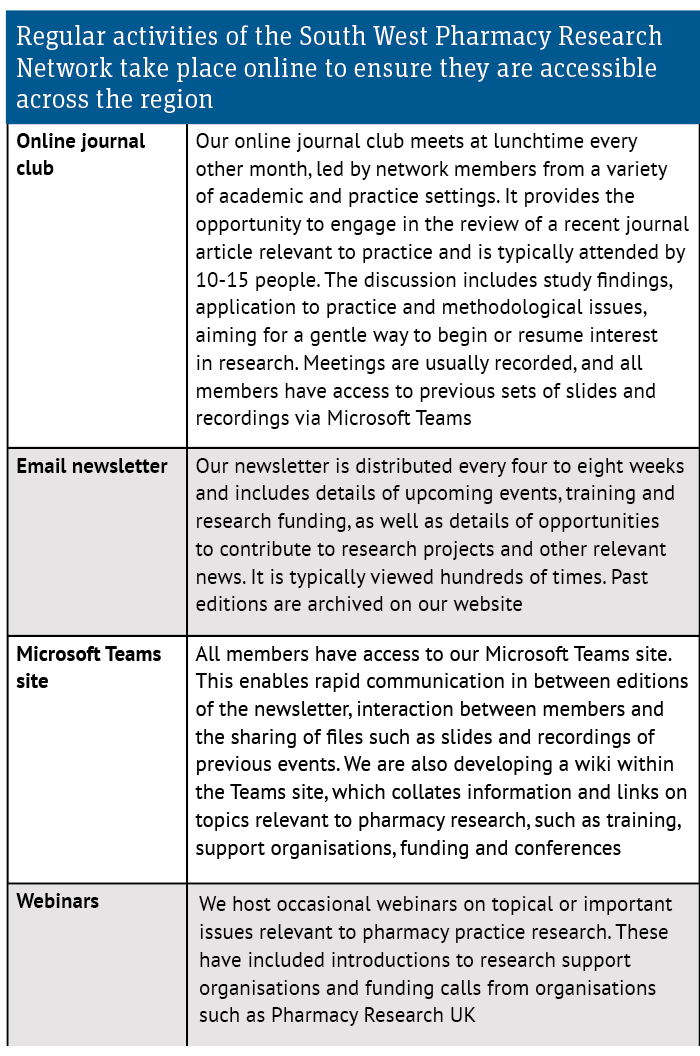In Profession news
Follow this topic
Bookmark
Record learning outcomes
Pharmacy across the UK is operating in a challenging environment, but this is particularly acute in the south west of England, which had the fewest community pharmacists per pharmacy in 2021 and less than half the number of pre-registration trainees per pharmacy than the next lowest region. Unsurprisingly, it also had the greatest proportion of unfilled community pharmacist vacancies (14 per cent compared to the national average of 8 per cent).
In Somerset in 2022, 32 per cent of community pharmacist posts were unfilled with various initiatives to attract and retain staff under development. This includes the innovative delivery of the University of Bath Master of Pharmacy programme at the University of Plymouth from October 2024, because applications to pharmacy courses from students living in the south west are only 10 per cent of the national average after adjustment for population size and age profile.
An international systematic review of barriers to pharmacist recruitment identified a number of key factors of relevance to the south west of England, including professional and social isolation. A diverse professional experience, career development and wider scope of practice were seen as enablers.
This aligns with our own experience where we have seen that the development of a positive research culture can be an effective way to increase the job satisfaction and morale of pharmacists and pharmacy technicians, and thus improve staff retention. Of equal, if not greater, importance is evidence that patient outcomes are better in research-active organisations.
Not as involved in research
There has also been widespread recognition over the past few years that pharmacists and pharmacy technicians are not as involved in research as many other healthcare professions, particularly when compared with medicine, where dual clinical-academic career pathways are common.
Consequently, while the field of pharmacy practice research has developed over recent decades, numerous pharmacy-based services are introduced that have not been developed and/or evaluated in a rigorous way. This increases the risk of unexpected consequences and delivery of the intervention in unintended ways, and makes it more difficult to achieve widespread adoption of successful interventions. The original MUR service was a good example of this.
In contrast, the New Medicine Service was fully researched and evaluated, and found to be both effective and cost-effective. Therefore, a number of initiatives have recently been introduced, including the inclusion of research as a key part of professional frameworks for career progression and advanced practice, and NIHR funding for a ‘research incubator’ for pharmacy professionals, based at the University of Leicester.
Over the course of various conversations, we came to realise that action to support pharmacy staff in the south west of England to engage with research might have a role to play in addressing both these workforce and pharmacy research challenges. The under-representation of coastal and rural communities in much health research is also recognised, lending further weight to the need to encourage pharmacy research in our region. This, combined with an ageing population, makes the south west an ideal place to carry out much of the clinical research needed over the coming years.
We were aware of a similar initiative in the north east (the Great North Pharmacy Research Collaborative: greatnorthpharmacyresearch.wordpress.com), and so were inspired to establish the South West Pharmacy Research Network (bath.ac.uk/projects/south-west-pharmacy-research-network).
Development of the network
We established a steering group that met for the first time in September 2022. This included pharmacists, pharmacy technicians and researchers purposefully invited from many pharmacy sectors (community, hospital, primary care and regional services) and numerous research organisations (including universities, the Health Innovation Network, applied research collaboratives and the Clinical Research Network).
At its first meetings, the steering group developed and agreed the initial aims of the network, which were “to increase pharmacy research activity and the engagement of practising pharmacy staff in research, by acting as a catalyst and linking people, ideas, expertise, institutions and research funding across our region.
“We provide a forum to discuss ideas, find collaborators and learn – both for practitioners to learn about research methods, and researchers to learn about current practice.” We then designed a menu of activities that helped address these aims ahead of the network launch in December 2022.
By promoting the network through professional networks (such as local pharmaceutical committees and regional NHS meetings), as well as by our web page, social media and word of mouth, we have grown quickly to over 200 members in January 2024. Our membership comes from all sectors of pharmacy practice, all counties of the south west, and many research organisations including seven universities.
It is over 200 miles from Gloucestershire to Cornwall, so most of our activities take place online. These include a regular newsletter, lunchtime journal clubs and webinars, and a Microsoft Teams site. After more than a year of these activities we have established frequent discussion and engagement between a core group of people, which has led to a student project and new research sites for future projects. In addition, several members have used connections fostered through the network to support successful HEE-NIHR Integrated Clinical and Practitioner Academic Programme funding applications.
Meeting in person
Another early objective of the steering group was to meet in person, to enable members to establish stronger relationships and a better understanding of each other’s interests. A brief survey suggested that around 35 members would attend, so a small group of volunteers came together to organise an ‘Innovation Day’ in October 2023 in the centrally-located town of Taunton (bath.ac.uk/events/south-west-pharmacy-research-network-innovation-day-2023). We were fortunate to be awarded research capability funding by Bristol, North Somerset and South Gloucestershire Integrated Care Board, which enabled us to provide this event free of charge.
Ultimately, 44 people attended a variety of sessions, which began with a panel of pharmacists at varying stages of their ‘research journey’ describing their experiences and answering questions. This was designed to show that it is possible for pharmacy staff to get involved with research to a lesser or greater degree, and to give tips on how to do this.
There was also a series of workshops designed to develop key research skills, including finding collaborators, persuading employers to support research activity, planning a project and sharing findings. Most importantly there were lengthy breaks to allow for networking.
To help delegates learn about each other’s research interests and develop their research CVs, there was also a display of digital posters with prizes awarded in four categories. The guidance on poster submission was deliberately broad and inclusive, allowing a report on any stage of a project (initial ideas to final results) and any type of project (e.g. audit, quality improvement, service evaluation or research).
At the end of the day, 26 delegates shared an anonymous commitment to a step they would take to get more involved in pharmacy research (some of which are highlighted in the illustration below). These suggest that the event had successfully encouraged and enabled members to become more research active.
Engaging everyone
A key challenge we now face is to ensure that we are engaging with all sectors of pharmacy in the south west. We have a good representation of pharmacists from hospital, primary care and academic pharmacy, but are aware that we have very few members from community pharmacy or who are pharmacy technicians. This is despite evidence suggesting that the vast majority of community pharmacies engage in some form of research and most want to do so in the future.
Part of this may be due to community pharmacists facing severe financial pressures with a real terms reduction in funding of 30 per cent since 2015, which has resulted in the closure of 1,400 community pharmacies since 2016 and the remainder financially challenged with no immediate prospect of an adequate increase in funding.
We clearly need to do more to engage these groups despite the funding challenges and overcome the barriers they face, which include lack of time and remuneration, and increased workload as they introduce new services.
We encourage anyone in the south west of England with an interest (however small) in pharmacy research to visit our website (bath.ac.uk/projects/south-west-pharmacy-research-network) to find out more about what we do and how to join (which costs nothing).
We are particularly keen to hear from new members who work in community pharmacy. With more members from this sector we will be in a better position to ensure we are meeting their needs going forward.
Next steps
The South West Pharmacy Research Network has had a successful first year. Our regular activities are continuing and we are planning another Innovation Day for October 2024. We have also been awarded funding for events to identify and prioritise the research questions of interest to our members and subsequently build teams to apply for research funding.
We are still in the early stages of this work, but if the commitment and enthusiasm of our members continues, we can continue making a small contribution towards meeting the joint workforce and research challenges in the south west of England.



